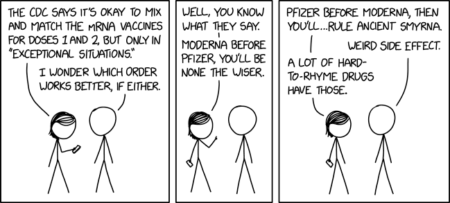Good news about coffee, about Covid, about tax credits, and more!
10 Feb 2021
Posted by Andrew Kantor
Good news
For the first time since November 2, the U.S. had fewer than 100,000 new Covid-19 cases in a day — 96,003 on February 7.
More good news
Georgia is considering extending tax credits for another year to pharmacies (and other businesses) that make hand sanitizer. Bonus: The article features GPhA member Ben Ross of Statesboro.

When the skin game doesn’t work
The idea seems perfectly reasonable: If people have to pay something for their healthcare, they’re less likely to use it willy-nilly, and would be smart about ‘shopping’ for it. They would save themselves money while saving taxpayers, too.
In reality, though, that doesn’t work. Few people compare prices or quality of service; they use the most convenient healthcare facilities. Even fewer think they can negotiate prices.
Healthcare isn’t like other goods — it’s hard (or impossible) to compare, and when you need it, you need it. So what’s obvious to economists in general simply doesn’t apply here … and has people skipping meds or procedures that they really need.
Facebook to close the barn door
Vaccine misinformation has been spreading unchecked on social media for years, but now Facebook claims it’s going to crack down on “erroneous claims about vaccines”. Amazing what the spectre of government oversight will do.

For the umteenth time….
The SARS-CoV-2 virus did not originate in a lab. It came from an animal.
Coffee comes through … again
Once again, coffee seems to have some nice benefits — assuming you consider “not having a heart attack” to be a benefit. A new meta-analysis from the American Heart Association found that “drinking one or more cups of caffeinated coffee was associated with decreased heart failure risk.”
Surprise downside: “Drinking decaffeinated coffee did not have the same benefit and may be associated with an increased risk for heart failure.”
The effect of gamma waves on hearing and perception
Depending on the size of your head (no offense, Charlie Brown or Stewie Griffin), your ears hear sounds at different times, and yet — aside from being able to determine the direction — our brain gives us a single sound.
Neurolinguists in Switzerland, where synchronicity is a way of life, figured out why. Your brain uses measurable oscillations called gamma waves; it can tell if the left and right waves are in synch of not, and compensate for the difference.
What makes this interesting? Understanding how the brain processes sound — and it’s obviously a bit unexpected — could lead to treatment for heretofore untreatable tinnitus: “[T]he connection between the two hemispheres of the brain can be successfully modulated by electric stimulation.”
Phages by mouth
As one prong in the attack on antibiotic resistance, phage therapy (matching killer bacteriophages to the invading bacteria) is slowly picking up steam. Normally those phages need to be delivered directly to the site of the infection, but now the Israeli company Biomx says it’s been able to deliver phage therapy orally — to the lower gastrointestinal tract, no less.
This (it says) is the first time phage therapy has been accomplished that way, and it could be a major stepping stone to the treatment becoming more widespread.



